“Loud music” Murder Case: Closing Arguments; Jury in Deliberations
Defense and State conclude their closing arguments, Judge Healey instructs the jury, and sends into deliberations
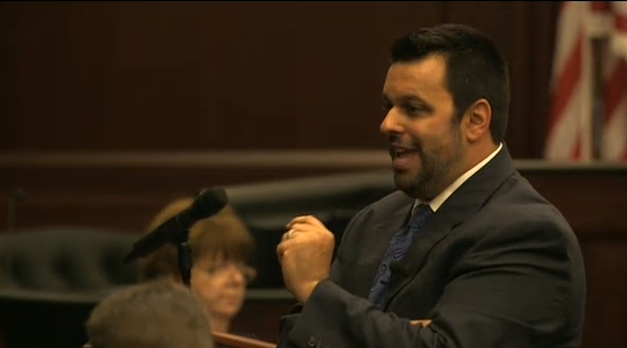
UPDATE: At 8PM the jury asked to be provided with access to the gas station video, all 20 minutes worth, and from all six camera angles. They also indicated that they were finished for the evening, and would continue their efforts tomorrow morning.
In addition, the four alternate jurors will be kept overnight, and also sequestered from the 12 primary jurors.
Judge Healey elected to recess until 10AM tomorrow, although he and the lawyers will meet at 9:30AM to iron out the protocol for providing the video to the jury. We’ll be here live with VERDICT WATCH from as soon as video is available from the court room, along with our usual live-tweeting.
Following today’s lunch recess the adversarial portion of the “loud music” murder trial segued through defense closing argument and state rebuttal without incident. This was followed by Judge Healey instructing the jury, identifying (my number) the alternative jurors, and sending the 12 primary jurors into deliberations.
Defense Closing: Cory Strolla
Strolla did a very solid job on his closing, better than much of this trial work, and especially given what he had to work with. His mission, of course is to accomplish one or both of the following goals: (1) create a reasonable doubt in the juries mind on at least one of the elements of each of the crimes charged and/or (2) create a reasonable doubt, for every element of self-defense, that the State has disproved self-defense.
To put it another way, in order for Dunn to be convicted of any one of the crimes charged (or their lesser included offenses) the State must BOTH prove EVERY element of that crime charged beyond a reasonable doubt AND they must disprove AT LEAST ONE element of self-defense beyond a reasonable doubt.
Strolla began by emphasizing that Dunn had the protection of the law, and the presumption of innocence. Dunn need prove absolutely nothing, rather the burden–both for proving the crime and disproving self-defense–rested solely upon the shoulders of the State.
Strolla then pointed out that Assistant State Attorney John Guy had gone so far as to claim in his opening that the State would prove Dunn’s guilt beyond ANY doubt.
Then Strolla began to attack the evidence supporting the State’s narrative of guilt. He noted, for example, that there was not a single witness who had testified that Dunn had evinced any hate or anger to any person. At worst, he had said that he hated “thug music,” as testified to by his fiance Rhonda Rouer.
The State, Strolla said, wants you to believe that Dunn’s blood was in a boiling rage. But all the evidence is that he was in a good mood coming back from his wedding. No matter how much Assistant State Attorney Wolfson yells, noted Strolla, there was no witness testimony of anger by Dunn towards anybody.
Strolla also emphasized to the jury that they were not to consider the media, or public gossip, but ONLY the evidence that had been presented in court. This was surely in no small part to ensure that they did not consider the content or gossip about any of the jail house phone recordings–none of which was ever introduced into evidence–or the jail house letters–only one or two of which were introduced into evidence. The State, Strolla emphasized, had to overcome the presumption of innocence with evidence, not emotion or anger.
Strolla also characterized the State’s witnesses as being resistant to his questioning. Whereas they were simply responding “yes, no” to the prosecutors, when questioned by him, he said, he practically had to pull teeth to get responsive answers. (In fact, much of this was created by Strolla’s antagonistic demeanor and often vague and open-ended questioning.)
He also argued that some of the State’s witnesses got special treatment for their testimony. Shaun Atkins got to stay in the Sheriff’s lockup, a much nicer environment than the prison in which he had been serving his sentence. Christopher LeBlanc had had a warrant for his rest made to go away by the State. Tommy Storns got a sweetheart deal on his parole violation the night of the shooting.
The SUV, he noted, had been away from the gas station for three minutes before returning. He then made the dramatic motion of not speaking for a full three minutes, except to announce each minute as it passed. During this period Michael Dunn’s father was observed in the court room.
Also present in the court room was Homicide Detective Oliver. Ron Davis, Jordan Davis’ father is seen past Oliver’s right shoulder, and Lucia McBath, Jordan’s mother, over his left shoulder.
Strolla argued that the three men from the SUV–Storns, Brunson, and Thompson–never told the police where they’d had the SUV parked while gone from the station. He also argued that within minutes Tommy Storn’s cousin was on scene. Why, he wondered, was it so much more important for Storns to call his family than to call 911?
He noted that Thompson did call 911 from the gas station, but was eerily calm on the 911 call recording (which the jurors will have with them in the deliberations room).
Strolla Argues Police Investigation Incompetent
Strolla then hit a series of talking points regarding the claimed incompetence of the police. Why didn’t the police bring in K9 units trained to find guns and drugs? Homicide Detective Musser said it wasn’t his job.
Why didn’t the ME obtain the original data on the the toxicology tests, rather than rely on the hand written notes of the toxicologist? ME Simons said it wasn’t her job.
He then criticized Wolfson for arguing, in her closing, that Dunn’s inconsistencies were fatal to his credibility. Why are the defense inconsistencies a problem, but inconsistencies among the State’s witnesses are not? When the three boys from the SUV met days later with Ron Davis, Davis himself testified under deposition that their stories were not entirely consistent.
Strolla also semi-mocked the lesser included criminal charges, suggesting that they were in place precisely because the State didn’t have confidence in its indictment charges of first degree murder.
Self-Defense: State’s Burden To Disprove
From there, Strolla shifted to self-defense. He again reiterated that it was the State that must disprove self-defense, and urged the jury not to let them get away agains with saying, “it’s not their job. It’s ALL their job.”
He again mocked police performance, suggesting that the only reason Davis’ weapon wasn’t recovered is that they didn’t search for it until days later. Further, the only reason Dunn had ever even hesitantly doubted whether Davis had a weapon was because the police had told them they’d found nothing when Dunn believed they had thoroughly searched–but they had not thoroughly searched.
Dunn’s Character Witnesses.
Strolla then switched tacks to focus on Dunn’s apparent calm demeanor. All the character witnesses, he pointed out, had attested to Dunn’s reputation for peacefulness. Dunn was in a good mood that day, the wedding participants–including his ex-wife–had testified. Does it really make sense that he whipped out his gun and fired for no adequate provocation, Strolla asked.
Impeaching Rhonda Rouer
Then Strolla turned to the testimony of Dunn’s fiance Rhonda Rouer, which had been particularly damaging in rebuttal the prior day. In particular, Rouer had denied Dunn’s claim that he had mentioned Davis possessing a weapon at any time prior to his arrest, and that Rouer had not phone his Federal law enforcement neighbor about the shooting but that the neighbor had contacted them merely to discuss social plans.
The State, argued Strolla, seeks to hang their hat on Rouer, but Rouer is essentially a basket case and was more so in the immediate aftermath of the shooting. When asked on cross by him whether it was possible that Dunn had told her about the gun but that she’d missed it because of her stressed out condition, she’d conceded it was possible. The same with the disputed phone call to the LEO neighbor.
Strolla then turned back to the police failure to record the interviews with the three boys in the SUV, noting that the absence of these recordings made it all but impossible to catch them in any effort to change or align their recounting of the night of the shooting. This was essential, he said, because the boys were in the best position to hear Davis’ threats against Dunn–yet they all insisted that while they’d heard much other speech between Davis and Dunn they mysteriously hadn’t heard the threats. They were never going to admit the threats, he said, because Davis was their friend and they wanted his death avenged with Dunn’s conviction.
He criticized the police for not adequately determining if the child safety locks were on. In any case, he said, even if the locks were engaged, Davis’ window was open and he could simply have reached through the window, grasped the outside door handle, and opened the door.
Bullets Can’t Violate the Laws of Physics
Strolla then turned to the bullet trajectory evidence, arguing that the State’s interpretation of it was contrary to the laws of physics. In fact, the evidence was consistent with Davis being outside of the SUV, not inside.
Repeating his “garbage-in, garbage-out” analogy from the trial proper, he argued that the ME had failed to consider the variables necessary to determine properly whether Davis was inside of our outside of the SUV.
Justifiable Use of Deadly Force
Strolla finally moved to self-defense. He noted that self-defense is a defense to all the charges if Dunn reasonably believes he was at imminent threat of aggravated assault, grave bodily harm, death.
Indeed, he urged the juror to tackle self-defense first in their deliberations, because if they couldn’t get past self-defense they need never debate the criminal charges. (You’ll recall that Mark O’Mara had made a similar suggestion to the jury in the Zimmerman trial.) He again reminded the jury that the State had to disprove self-defense beyond a reasonable doubt, and therefore, had two overcome two thresholds of beyond a reasonable doubt.
He then focused on the definition of reasonable doubt, pointing out that it’s not a possible doubt, a speculative doubt, an imaginary doubt. If they have a reasonable doubt whether Dunn acted in self-defense, they must find that he did so act in self-defense, and therefore acquit him of all the criminal charges.
He cautioned them to be as certain of any verdict of guilt as they could, because if they found themselves with uncertainty a day or a week or 10 years later, it was too late. And with that, he wrapped up his closing my asking the jury to return the only “just” verdict, not guilt.
Assistant State Prosecutor John Guy
To my disappointment, instead of ASA Erin Wolfson returning to deliver the rebuttal close, John Guy stepped up to do so. That said, I was favorably impressed with his closing, which was much better than I’d come to expect from him. For the most part he was able to keep his histrionics in check and hit the key legal points.
Guy opened his close with an appeal for the jury to apply it’s common sense, and then began working though a series of talking points–accompanied by power point slides–emphasizing “Common Sense reasons Michael Dunn is Guilty”
(1) If Jordan Had a Gun, Dunn Would Have Said So to Rhonda Rouer
(2) If SUV Had Been Aggressors, They Would Not Have Returned to Gas Station
(3) If Jordan Davis Had Gun, Dunn Would Have Been Shot
(4) If Dunn Acted In Self-Defense, He Would Not Have Fled
(5) If Dunn Acted In Self-defense, Would have Called 911
(6) If Dunn Acted Self-defense, Story Would Be Consistent
(7) Dunn Self-Defense Utterly Inconsistent With ME Expert Testimony
(8) If SUV Door Open, Door Plastic Be On Ground, Not on Seat
(9) If Davis Door Open, Would Have Been Damage to Dunn’s Car
(10) If Dunn Was Later Afraid, Would Not Have Left Gun in Car
Guy then turned to some specific pieces of Dunn’s testimony.
It Didn’t Matter to Me When I Called Police
This comment was around Dunn’s explanation that because he had acted in lawful self-defense, and therefore had not committed a crime, it wasn’t really important whether he called the police that night, the next day, or two weeks later. Guy mocked this in comparison to Dunn’s claim that his request to the young men to turn down their music was merely a “common courtesy.” Would not, Guy asked, calling the police after shooting at a car full of people been a “common courtesy” if you really believed you’d done nothing wrong?
Gangsters-Thugs
Guy then focused on the arguably “angry”language by Dunn of the terminology “gangsters” and “thugs.”
At a Loss to Justify
Guy also focused on Dunn’s (arguable interrupted) statement to Homicide Detectives Musser and Oliver that he was at a loss to justify his last three shots at the SUV.
Reasonable Doubt, the Human Face of Jordan Davis
Guy then wrapped up by covering again what reasonable doubt was, and wasn’t, and by showing the photo ID of Jordan Davis, and to ask the jury for a verdict of guilty on all the charges.
Judge Healey Charges The Jury
Judge Healey then moved immediately to read the jurors the extensive jury instructions, dismiss (at least tentatively) the alternate jurors, and send the jury into deliberations.
The model jury instructions relevant to the case can be read here (these would have been customized for the facts of this case before being presented to the jury): “Loud Music” Murder Trial: Relevant Florida Jury Instructions
The final 12 jurors are profiled here: “Loud Music” Murder Trial: THE 12 FINAL JURORS
Keep on Eye on Legal Insurrection for Breaking News on Any Verdicts
–Andrew, @LawSelfDefense
Andrew F. Branca is an MA lawyer and the author of the seminal book “The Law of Self Defense, 2nd Edition,” available at the Law of Self Defense blog, Amazon.com (paperback and Kindle), Barnes & Noble (paperback and Nook), and elsewhere.
 DONATE
DONATE
Donations tax deductible
to the full extent allowed by law.






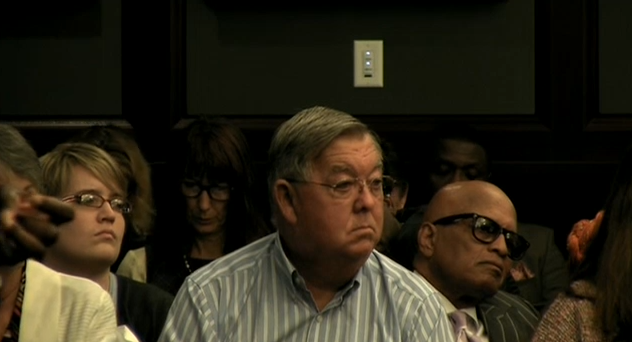
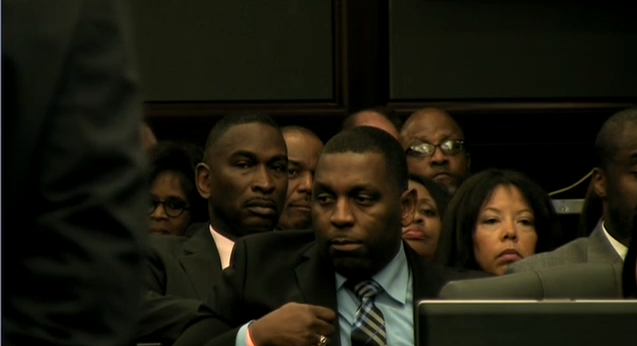











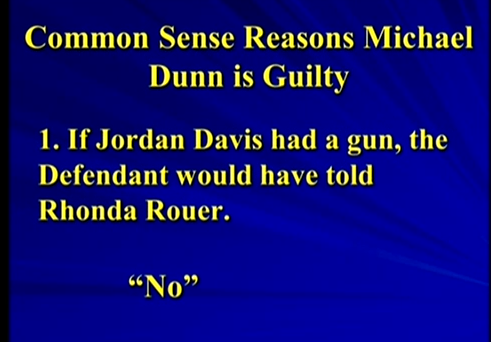
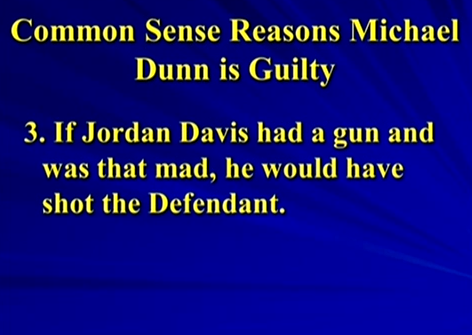
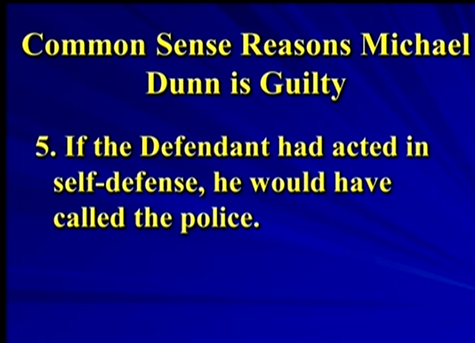
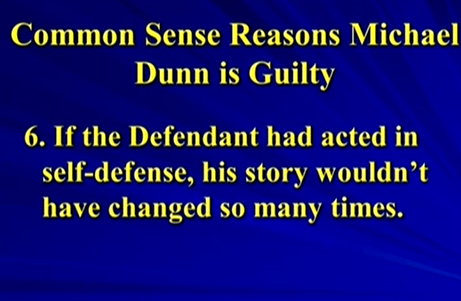
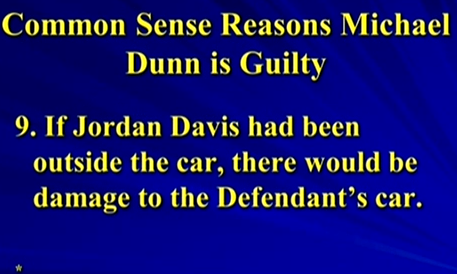
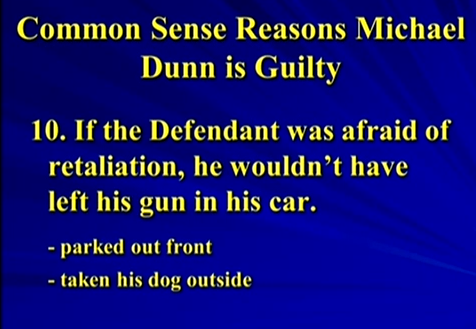
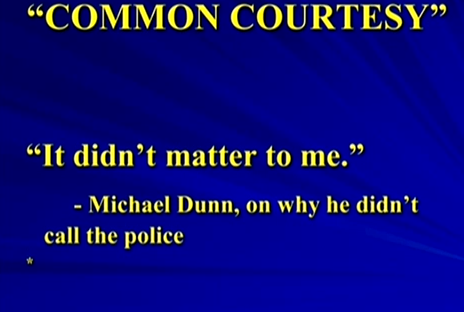
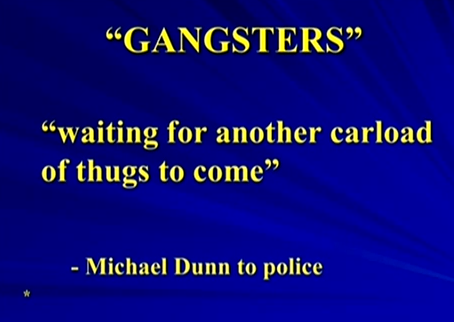
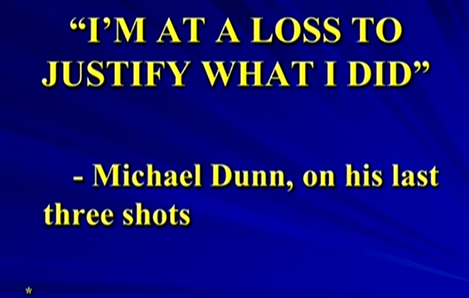
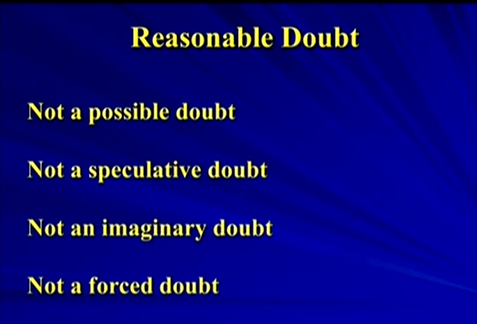
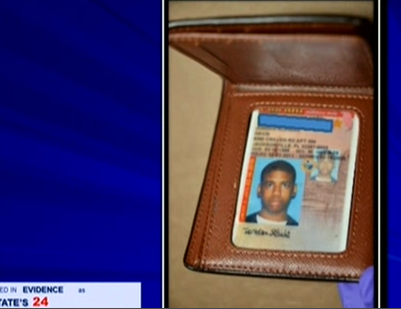







Comments
Seems like this case comes down whether you believe Dunn or not, and if you don’t (and i think none will) how a juror is going to figure premeditation vs 2nd degree.
I think Dunn is telling the complete truth. I think once again an innocent man is being bent over by the legal system because he dared kill someone from a demographic which likes to riot when they don’t get their way. Or otherwise create bad publicity, get police chiefs fired, etc.
Troll.
I think Dunn is lying through his teeth. I think he had more than “3 or 4″drinks. I think that the people that stated Dunn wasn’t drunk aren’t qualified to make that judgement. I think the only person that knows Dunn well enough to claim is a calm, easygoing guy, is the one that his attorney just described as a “basket case”.
Then why didn’t they get the bartender to testify that Dunn was drunk?
Agreed, genes. Remember: “drunk” and “impaired” are not necessarily the same state of mind. Alcoholics can be fully functional with a BAC of .18, where I would be passed out on the floor.
I think Dunn was loaded and freaked out when Davis started cussing him out. When he saw the driver with the dreadlocks he thought for sure it was a car full of “thugs.” In his mind those 4 teens were going to jump out of the car and beat the crap out of him. I think he fled the scene and did not call 911 because he was legally drunk and at the time he didn’t know he had killed someone. He had plenty of time to fabricate a story to tell the following day. His girlfriend screwed him big time with her testimony but she sure wasn’t going to jail for perjury that’s for sure. One would think the first thing out of his mouth to the girlfriend when she got in the car and asked what happened would be…..”that thug tried to shoot me.” I hope Dunn is found guilty of murder 1 and 3 counts of attempted murder.
Yeah, I sure wish I was black. They have all the advantages. White people don’t have a chance. That is why it is OK for them to shoot black people for playing thug music.
Yeah, I believe Dunn. It makes perfect sense that he continued to shoot even as the SUV was fleeing from him. He claims they could have still shot him with the non-existent gun. But he shot through the back of the SUV even though he could not have been in jeopardy at that time.
Oh, how cute!
And clever. Satire for the sake of a point.
Now play the victim some more, call us all bullies, and remind of your height and weight and how tough since you know Tae Kwon Do.
That and the fact that he paused in his shooting, then shot 4 more times, after the SUV was driving away. I have said from the beginning, that that is equivalent of chasing someone down. I think that is a huge, huge problem that can’t be overcome by the defense.
If the kids actually had been pointing a shotgun at him, I think suppressive fire would have been appropriate since a person can still fire on you while they move away. But with no evidence that the kids had a gun at all, every round he fired was unjustifiable.
If someone were driving away from me while a passenger had a gun with which they putatively wanted to shoot me, I’d duck, not fire. Point being that they’re driving away from me, not towards.
Now. If they were driving towards me, it’s a different story.
Guilty or Not Guilty is a close call. Not Guilty on the major charges and Guilty on some of the lessor charges. His lawyer did well considering what he had to work with here. Corey turned the important parts of this trial over to subordinates because she was afraid of the embarrassment of losing this one.
Yes I pointed that out in another thread. I think it means Corey is not confident of a conviction. If she were confident, you can bet she would hog the limelight by taking one of the closings.
“If they have a reasonable doubt whether Dunn acted in self-defense, they must find that he did so act in self-defense, and therefore acquit him of all the criminal charges.”
I think you meant to say, if they have a reasonable doubt regarding the prosecution’s disproof of each of the elements that make up self-defense, then they must acquit.
The language is awkward because of the implicit double negative. Seems the only proper way to say it is:
“Once the defense has met its burden of production on self defense, the State bears the burden of disproving self-defense beyond a reasonable doubt.”
–Andrew, @LawSelfDefense
The jury has asked for video/audio that seems to suggest they may be looking at the time between volleys of shots. If Davis was not killed by the second or third volley but the jury deems those outside of self-defense, are they moving toward an attempted murder conviction?
Either that or they wanted to see if all the witnesses in the Gate (especially the three in the car) were “colluding” while waiting for the police to talk to them. The Defense lawyer seemed awfully gleeful when he found out the jurors wanted to watch the entire video.
Right, if they wanted to just see the time between the volleys, they would have asked for a tape of the volleys. They want to see all the video, including stuff happening after the shooting.
I continue to be astounded at just how weak the state’s case is. It consists mainly of logical Swiss cheese, and repetitious insistence that certain assumptions are facts. Despite press ballyhoo, these two things (aside from the presence of Corey and Guy) are the only real similarities of this case to Zimmerman’s.
Here are a couple of logical problems from the visual aids –
“If Jordan Davis had a gun, the Defendant would have told Rhonda Rouer.”
We don’t know that he didn’t. We do have testimony that she doesn’t remember any such thing now. We also have evidence that she’s a wreck. I wouldn’t care to pin too much on her memory … certainly not enough to lock somebody up in a cage for a couple of decades.
“If SUV Had Been Aggressors, They Would Not Have Returned to Gas Station”
The SUV isn’t an aggressor, the SUV is a piece of machinery. The aggressor (according to Dunn) was Davis, who we now know was dying and probably not in a terribly aggressive mood. The other three occupants were never claimed to be particularly aggressive during this incident. But there are certainly some mysteries. For one, why did the driver return to the gas station where there was some crazy cracker with a gun?
That’s enough for starters. The others can be examined in a similar vein. What looks like a string of damning questions is actually pretty weak stuff. Not completely useless, but hardly satisfying a useful burden of proof.
As for assumptions, the big ones stem from what’s seriously lacking in this case – motive. What would be Dunn’s motive for shooting up this SUV? The motive could be (1) self-defense, (2) a mistaken belief that self-defense was necessary, or (3) something else. The something else is where the state’s assumptions come in. The prosecution rejects (1) completely, and may not know how to handle (2), I don’t know. But for (3) it insists that Dunn – well, what, exactly? Hated rap music enough to shoot someone over it? Hated some kid who “disrespected” him enough to start shooting? The guy we saw on the stand didn’t seem to be any seething cauldron of hatred. Perhaps he was on some medications at the time which might induce paranoia, but in that case someone should have been able to supply testimony to that effect. Prescription drugs leave a trail. Or maybe the guy’s a major-league psycho without any help from drugs, and is just good at hiding it. But I want the prosecution to show that, not just insist on it.
Motives (1) and (2) are problematical as well, particularly Dunn’s final three shots at the SUV, which are difficult to reconcile with any reasonable self-defense scenario. But if the prosecution followed that line of reasoning at all, I missed it; certainly possible, as my A/V connection was miserable today.
On 2. Even if it is a mistaken belief, but if it is a a mistaken belief that a reasonable person could have then it’s legally justifiable.
The big problem is the cops did not investigate. They showed up they took the word of three boys and never once thought they might lie. Instead they started a manhunt. If they had they thought to investigate, self-defense would have been high on their list. They would have searched for a weapon. Then we would know one way or another.
You know what. I think the upper brass were telling the investigators they did not want to find a gun. A gun would mean they would have to let Dunn go, After the early protests they did not want to let a white guy shooting a black kid go. So they went through the motions of looking for a gun, but never really tried.
Dunn’s big problem — and it is a BIG one — is that he wasn’t there to tell the cops, “hey, these kids threatened me with a gun.” What, are the cops supposed to be psychic? If you call the cops and say someone shot your friend, they should search your car for weapons in case you provoked it?
Dream on. Dunn’s actions after the shooting were not those of an innocent man. The cops didn’t drop the ball. He did.
Exactly.
^^^ This. ^^^
–Andrew, @LawSelfDefense
Dunn is self-evidently not comfortable with black culture; note his reference to “thug” music. It is not at all unreasonable for an older (very white) man to over-react to the stereotypical “gangtsa” culture portrayed in the media. In this case, four young black men listening to (loud) rap == four violent, white-hating gang-bangers who want to “kill whitey.” Dunn reacted to the voices in his head.
It is, by the way, a challenge to claim self-defense when the alleged assailants never demonstrably had a gun.
No gun found. (I know, it was the one-armed man who took it!) TEN rounds fired, and none returned. Where’s the shotgun then? You’d think they’d shoot back at that point. After that Dunn flees, and doesn’t call 911. Really?
There’s a milblog called This Ain’t Hell (recommended) which features a regular “feel good stories” about regular citizens defending themselves with guns, up to and including killing perps. Not one time have I ever read a story wherein the law-abiding citizen defends him/herself then runs from the cops.
Dunn’s story stinks to Nifleheim.
First-degree Murder may be problematic, but I would have no problem voting for second-degree Murder.
This is in the same category of the the old fool who killed someone in a movie house over texting. The victim in that case didn’t have a gun either.
Did Dunn have a history of aggression and a “cop wanna’ be” thirst for power as was outlined by the prosecution in the Zimmerman case? Does Dunn have a history of shooting off his gun in public just to intimidate?
What did the boys in the SUV say to Dunn that would make him go to such lengths of self defense? Did the boys actually say they were going to kill Dunn? What would anyone within a group have to say to another lone individual who doesn’t have a history of aggression to get that lone person to fire their weapon at that group? It doesn’t happen every day. I can’t remember anything similar happening in the news except gang members firing on another gang in a drive by for territory.
As for the reasons why Dunn kept firing at the fleeing SUV I can only assume his fear and the heat of the moment adrenaline rush distorted his judgement that someone was firing back just the same as why a large group of police officers were emptying their guns on one suspect in a car chase incident I saw in the news several weeks ago. Surprisingly that lone suspect survived at least 5 bullet wounds. Police must feel they can’t aim very well when firing at someone in a parked car.
Some cops couldn’t shoot themselves in the ass if they sat on their gun.
Sorry I couldn’t resist.
from the bullet holes, it sure looks like all the shots were aimed at only one individual, if dunn was mad about the rap crap, he woulda aimed at least once at someone else ?
clearly dunn perceived a threat coming from this one person
Or was clearly trying to murder this one person.
BTW my vote is hung jury.
Is the judge going to keep the alternates till a verdict?
Some very weak arguments in the prosecutions final arguments.
1. “If Davis had a gun”
No matter what a defendant says, he will always fail to say something. The prosecution can’t hang its hat on what a defendant didn’t say. The absence of a statement of fact is not evidence for the fact’s absence.
2. SUV aggressors wouldn’t return
Why not? Aggressors often leave and return. Very common among gangsters to behave in this way. They go away, secure weapons and/or make a plan, then come back at their target, trying to catch the target unawares. Many drive-bys are of this “go away then return” nature.
3. If Davis had a gun, defendant would have been shot.
Only if Davis had fired. Many would-be gangsters are known as “less than dedicated personnel,” meaning that they act all bad until someone pulls a gun on them. There are plenty of videos on YouTube showing this phenomenon. Even unarmed people, reacting with suddenness and violence, can overcome gangsters with guns, and the gangsters don’t fire a shot. They either get the bejeezus scared out of them by the violence, or they are so surprised that they’re being resisted that they simply forget that they’re armed too.
6. Changing story.
The mind is not perfect. Tell a story of an incident three times, and three different stories will be told. And at each telling, the story teller will honestly believe that he’s telling the “real” story. Memory is fallible and malleable. If I had a defendant who had changed his story, I’d have an expert on memory on the stand to tell the jury why that can happen and that it isn’t a reliable indicator that the defendant is covering up anything. Esp. after a violent encounter, a person is trying to make sense of his memories of the event, and will shape and re-shape his story for his own purpose of attempting to understand what happened. This is just the way the brain works. It’s a coping mechanism that permits a person to deal with unpleasant events.
I could go on, but you get the idea.
So why did Dunn run away again- and then order a pizza, etc.? And then not contact the police ever?
And why did he shoot at a fleeing vehicle?
And why do you assume these guys were gangsters, since you keep bring up the actions of gangsters to justify Dunn’s actions?
I do agree that some of the prosecutions talking points are arguable, but the actual evidence is stacked against Dunn.
As others have said, the only evidence of self-defense is Dunn’s testimony and he is proven himself less than credible by his own actions.
(1) “The absence of a statement of fact is not evidence for the fact’s absence.”
It certainly is, if the fact is relevant and indeed essential to the defendant’s claim, the jury is perfectly within its rights to infer from its absence that the fact does not exist.
(2) “Aggressors often leave and return.”
When they do, it’s with the intent of acting aggressive. There was no indication of any sort–zero–of any aggressive intent on the part of any occupant of the SUV when they returned. Instead, their actions are completely consistent with seeking help for the injured Davis.
(3) “Many would-be gangsters are known as “less than dedicated personnel,” meaning that they act all bad until someone pulls a gun on them.”
Now we’re to speculate that Davis had a gun (that no one but Dunn “saw”), vowed Dunn’s death (that no one but Dunn “heard”), got out of the SUV (as no one but Dunn observed), and upon Dunn’s presentation of his handgun turned his back rather than defend himself by firing first?
OK, let’s stipulate for purposes of discussion.
Why, then, did Dunn flee the scene and never call police, given that he’d been the victim of an aggravated assault? Why did he not keep his gun on his person–he had the holster–if he feared a re-engagement? Why did he not bring the gun into the hotel–he’s really going to defer to the sentiments of his stressed-out fiance to leave himself unarmed if he believes an SUV of gun-armed gangsters and their friends are seeking him out? And not call the police, if only for protection against such an attack?
It’s simply not credible.
With so much of your thread of reasoning hanging from the peg of Dunn’s credibility, it would be nice if that credibility hadn’t been all but sawn through by Dunn’s flight and failure to report.
(4) “The mind is not perfect. Tell a story of an incident three times, and three different stories will be told.
Yes, the details change. The essential elements do not. If I have consensual sex with a woman, and later find myself being questions by police because she’s accused me of rape, I might well describe the color of her shoes three different ways on three different occasions. But I surely won’t change my story on the rather essential element of consent.
Similarly, if I’ve had to fire 10 rounds at someone because they’d represented a source of imminent death or grave bodily harm, that threat in the form of a gun, my story might vary on the exact number of shots I fired, but not THAT I fired. It might vary on the exact nature of the long gun — rifle? shotgun? –but not THAT it was a long gun.
Dunn’s leaving the “detail” out of his recounting to Rouer–or his neighbor “Ken” he spoke with that morning, or we can be sure the defense would have called Ken to the stand — and then including it in his account to police a few hours later is not the variance of a non-essential fact that can be put off to normal variation of memory.
But all these points are beating around the bush. The gaping hole in Dunn’s narrative of innocence is entirely his flight from the scene combined with his failure to call police or otherwise act as would a reasonable person in continued fear following the shooting.
Instead, his conduct post-shooting is completely consistent with someone possessing consciousness of guilt who hoped that he’d not been identified in his flight and intended to keep things that way.
–Andrew, @LawSelfDefense
Question: who buys the majority of rap/hip-hop/gangster rap music? Young white kids. Dunn is a bigoted and prejudiced social misfit who consumed enough alcohol for his judgment to be impaired. Perhaps if he had been completely sober, he would not have started an altercation with four kids just out to have a good time. If I’m on the jury, I vote that Dunn perceived a threat that was not there. I don’t see self defense at all. Murder 2 and 3 counts attempted murder 2.
Why does this prosecution team, in this trial and in Zimmerman’s, insist on focusing on a couple angry words? Is it really relevant to the trial whether Dunn said he hates “thug music” or “rap crap”? Was it relevant to the Zimmerman trial if he said “These assholes always get away” or “fucking punks”? People get angry, people say mean things, all the damn time. It is an accepted part of both the defense and prosecution’s version of events that Dunn was annoyed by the music and that alone explains why he would say something negative about it. Zimmerman was annoyed by the burglary problem in his neighborhood, both the defense and prosecution in that case agree on that point. Obsessing over these completely irrelevant quotes only drives baseless speculation about racism for those who made up their minds about the case as soon as they saw the photos in the paper. Dunn has probably been proven guilty, Zimmerman was not proven guilty, and neither case depended at all on whether they said a couple angry words.
Because a person’s spoken words are typically a reflection of their state of mind.
Zimmerman’s utterances WERE relevant, just not in the way the State attempted. They wanted the jury to believe they were uttered in anger, even rage. In fact, anyone who actually listened to the recording of the words–as the jury did–could clearly hear they were uttered in frustration.
You’re entitled to believe it made no difference to the jury whether Zimmerman spoke in rage or frustration, but I’d be inclined to disagree.
In this case, Dunn’s characterization of the men in the SUV as “thugs” before he’d had any substantive interaction with him goes to his potential state of mind, and can help explain how a man who is supposed to have such a great reputation fore peacefulness (although apparently nobody who not primarily a friend of his parents or a years-ago work colleague appeared in court to testify to this) would draw a pistol and shoot at people who hadn’t actually threatened him with deadly force.
You’re quite right, however, that the language is not the core issue here, and was not the core issue in the Zimmerman trial.
In this case, the core issue is the combination of Dunn’s flight and his failure to call 911, as well as his failure to make any mention of a weapon until captured by police. His explanations for these matters is weak, at best.
–Andrew, @LawSelfDefense
Andrew,
Can prosecutrix Angela Corey bring an accessory after the fact charge against Rhonda Rouer with a reasonable likelihood of conviction?
I don’t see it under these facts.
If Rouer had played some active role in the post-shooting decision-making–helping to hide the weapon, for example–or had failed to fully cooperate with police and prosecutors, I’m sure Corey would have hit her with an accessory charge like a ton of bricks. (Her expressed desire to return home is, I think, insufficient, as clearly Dunn was the dominant personality in the relationship.)
But her demeanor has consistently been so passive and helpless and sympathetic, and her interactions with police and prosecutors so cooperative–and, at times, outright damaging to Dunn–that I just don’t see it.
–Andrew, @LawSelfDefense
Do you see any jury convicting her?
OK, here is something for the “speculating spectators” here at LI: what if Corey had his client take a psych eval and it was absolutely devastating to the defense? He does not have to disclose results to state. Discuss!!
Does the stand your ground law and using deadly force to defend oneself according to Florida’s statutes require someone to call 911 afterward since the victim feels they were within the law?
Someone who sees them self as a victim would call 911 for the ambulance if they were injured. Dunn was not injured and didn’t know at the time he killed someone while in the hotel. Dunn felt he was now in a safe place to decompress from the stress and shock of what he had to do to defend himself. At that time he did not think he was a murderer so why call 911.
To clarify about the “gangster” assumptions I’ve commented about as cause for Dunn’s fear based frame of mind, Dunn as most folks who don’t adopt or understand the “gangster” style/culture cannot distinguish the harmless “posers” (those who wear the gangster clothes and music just to look cool) from the real criminal gangsters who have been portrayed in the media wearing the same clothes and listening to the same music as violent people who wouldn’t think twice about popping a cap in anyone just for asking them to turn down their music. The look of gangster style has a long established reputation as a form of urban intimidation in order to gain respect among their peers.
Maybe Dunn saw these teens as harmless gangster “posers” and didn’t expect these teens to threaten him just for asking them to turn down their music. In that split second upon threatening his life the “posers” changed their perception to gangster hit men to treat Dunn as an initiation rite of passage in order to build a gangster reputation in Dunn’s frame of mind. All this is speculation of course.
But from the testimony of the three witnesses in the SUV as the only evidence against cause for self defense, I see Dunn convicted. That’s the rules. Zimmerman had no eye witnesses to speak against self defense claims.
“Does the stand your ground law and using deadly force to defend oneself according to Florida’s statutes require someone to call 911 afterward since the victim feels they were within the law?”
The fact that calling 911 is not an element of FL’s justified use of deadly force statute doesn’t mean the jury cannot use it to infer whether Dunn’s claims–supported ONLY by his own testimony–of having acted in self-defense are credible.
Indeed, that’s their job.
I consider myself a self-defense absolutist, but do you REALLY believe that a person acting in supposed self-defense can shoot and kill another in a busy gas station and simply drive 2.5 hours home without calling the police? And that sounds like an innocent actor to you?
And don’t give me this nonsense about Dunn not “knowing” he’d killed someone. The tempo and accuracy of his shooting makes clear he was skilled with the pistol, and the killing shots were fired from fewer than a handful of feet away. The bullet strikes in Davis’ door could be covered by a man’s hand. He knew there was a very high probability he’d scored a hit.
The deal breaker here is his flight and failure to call 911. If he’d stayed at or near the station and cooperated with police, his claim of self-defense might be tough, but credible. As is, not so much.
The ENTIRE point of the “justified use of deadly force” is that the person who used the force can be assessed for whether that use WAS justified. Flee the scene, it’s no different than a bank robber fleeing the alarm bells.
–Andrew, @LawSelfDefense
Where does the law (or case law) say the defender must notify police? For that matter, where does it say anything about the person’s behaviour after the situation is over? As far as I can tell, the law is concerned with how the person behaves toward the alleged attacker DURING the incident.
Even if Dunn’s alleged ‘flight’ was inculpatory, at worst the jury might *infer* that Dunn was never going to report himself a the shooter, but such an inference is speculative. Granted, Dunn can’t prove that he positively WAS going to report it, either. But he doesn’t have to prove that, he has the benefit of the doubt. (How much time had passed before his arrest? Was it not less than 24 hours?) The prosecution would have to convincingly prove flight, e.g. Dunn’s words or actions to indicate that he was going to leave town, disguise himself, get a burner phone, etc. A man of 47 years of wisdom like Dunn would expect to be identified by witnesses and license plate, and yet he still went home where he knew the police could easily find him. There’s your reasonable doubt with respect to the ‘flight’ issue.
I found Dunn’s explanation for not reporting the incident immediately to be credible and reasonable… the combined factors of the panic, the basket case wife, and a pooping puppy, and the fact they are away from home. I don’t blame him for wanting to take the wife and dog home, collect his wits and talk to his neighbor. Sure, ideally he would have reported it right away. It’s not model-citizen behavior, but it’s not that damning either.
What about Bernie Goetz, who shot four people he believed were going to rob him? He rented a car, disposed of the gun, fled the state, and checked into motels under fake names. He finally turned himself in, but not until a *week* later when it became obvious the police knew who they were looking for, and that he would be caught eventually. And he was still acquitted in his self-defense trial.
(Great blog here, glad I discovered it.)
I’m betting acquittal or at worst, hung jury
“Where does the law (or case law) say the defender must notify police? For that matter, where does it say anything about the person’s behaviour after the situation is over? As far as I can tell, the law is concerned with how the person behaves toward the alleged attacker DURING the incident.”
The law says in ANY criminal trial the jury is perfectly free to look at the defendant’s conduct after the alleged crime and infer guilt or innocence from that conduct.
If the defendant was seen to throw the murder gun off a bridge after the killing, you think that’s not admissible, just because it happened after the killing? Because innocent people routinely throw firearms off bridges?
If the defendant attempts to threaten witnesses into changing their testimony so it’s more in his favor, you think that’s not admissible, just because it happened after the killing?
If the defendant places his own knife in his victim’s hand to fake the impression that his victim was armed when shot, you think that’s not admissible, just because it happened after the killing?
Really?
Conduct after the event from which a jury can infer guilt or innocence is perfectly fair game for the jury.
There’s even a formal legal term for it–it’s called “consciousness of guilt” evidence. And there is perhaps NO more classic example of consciousness of guilt evidence than flight from the scene.
I understand that the law of self-defense isn’t what you’d LIKe it to be. Tough. Best you recognize the fact that the law of self-defense is what it IS.
Shooting someone, killing them, and firing a bunch of rounds at three other people, and then fleeing the scene and never reporting to police until they’ve captured you at gun point is NOT the conduct of an innocent man. It’s the conduct of a man who though he’d gotten away with it, and hoped to keep it that way.
The whole point of the justifiable use of deadly force in self-defense is that you are held to account to justify it. You don’t just get to go about your business with no police involvement after you shoot someone dead.
Or, at least, you shouldn’t be able to. I guess we’ll see.
–Andrew, @LawSelfDefense
I didn’t say the evidence is inadmissible, or that the jury can’t look at that, I just believe that the simple fact that he had not reported it yet at the time of arrest is not enough to disprove the self-defense claim. Dunn’s behavior suggests that *maybe* he had a guilty conscience, and *maybe* is therefore actually guilty. It seems like a tenuous chain of inferences.
As far as intimidating witness or placing a knife – let’s stick to the facts of this particular case. Dunn did not dispose of the weapon. There was no witness intimidation by Dunn. He did not place a knife into anybody’s hand. Those are unambiguously guilty actions, and if Dunn had done those things then that would be a different matter and I wouldn’t be arguing about flight. But Mr Dunn’s post-incident behaviour *was* ambiguous. Sure his actions could represent consciousness of guilt. But they could, I believe, reasonably be that of a man who wanted to go home for his wife’s comfort and to collect himself before going to police. Indeed he might have been in flight, but it seems far from certain.
“The bullet strikes in Davis’ door could be covered by a man’s hand. He knew there was a very high probability he’d scored a hit.”
Heard this somewhere but can’t recall where, but in self defense training when using a firearm you don’t shoot to maim when you know the other person has a weapon pointed at you at close range. You shoot to kill. Hesitation means you’re dead. Maybe this was part of Dunn’s self defense/firearm training and it just became second nature with no hesitation. He didn’t stick around to check to see if the one he thought was firing at him was killed.
One thing that doesn’t make sense about Dunn’s testimony is he mentions the boys getting out or attempting to get out of the SUV after hearing one of them say “This is going down” which he perceived as them advancing toward him to do him harm, but the bullet strike patterns suggests the SUV doors never opened. Or was this one of the inconsistencies of his testimony? If so, that’s a huge inconsistency and I’m surprised that wasn’t brought up.
“Heard this somewhere but can’t recall where, but in self defense training when using a firearm you don’t shoot to maim when you know the other person has a weapon pointed at you at close range. You shoot to kill.”
Of course.
Doesn’t change the fact that he was skilled enough, and accurate enough, to have known he’d likely hit his target.
Regardless, he hit the SUV 9 times out of 10 shots. It’s frankly shocking that apparently nobody suffered a scratch except the first-struck Davis.
I don’t expect it would be easy to find a volunteer to sit in a range-car while someone fired 9 rounds into it, even if the shooter was deliberately NOT trying to hit him.
–Andrew, @LawSelfDefense